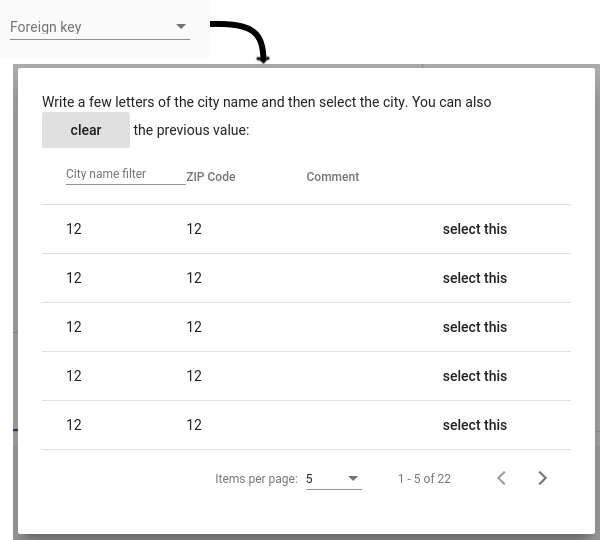This repo provides Django mixins and Angular library for rapid development of create/edit dialogs for django rest framework. It depends on Django 2, Angular 6 and Material UI.
Note: support for Angular 5 and Django<2 is not actively developed - use release/angular5 branch or 1.1.* versions of packages if you need that.
On django side, extend your Viewset to use AngularFormMixin
and optionally configure the mixin by providing either layout
information or field defaults (such as css classes). See demos
for details.
class CityViewSet(AngularFormMixin, viewsets.ModelViewSet):
"""
API for cities
"""
queryset = City.objects.all()
serializer_class = CitySerializerOn angular side, use DjangoFormDialogService to display a dialog:
constructor(private dialog: DjangoFormDialogService) {
}
createCity() {
this.dialog.open('/api/1.0/cities/').subscribe(result => {
console.log('City created, result from server is:', result);
});
}You can also display the form inside your own component via <django-inpage-form> tag.
<django-inpage-form django_url="/api/1.0/cities/"
(submit)="submit($event)"
(cancel)="cancel($event)"></django-inpage-form>See demos at http://mesemus.no-ip.org:12569
With a bit of work on your side, foreign keys and many-to-many relationships are supported as well (see the demos for details)
Django side:
pip install django-angular-dynamic-formsAngular side:
npm install --save django-angular-dynamic-forms @ng-dynamic-forms/core @ng-dynamic-forms/ui-materialTo render forms, this library uses https://github.com/udos86/ng-dynamic-forms - do not forget to add it to your package.json.
and add DjangoFormModule to imports. You will need to provide your own ErrorService for showing
communication errors back to the user. See the demo/angular/src/app/mat-error.service.ts for
an example implementation.
import {DjangoFormModule, ErrorService} from 'django-angular-dynamic-forms';
@NgModule({
declarations: [
...
],
imports: [
BrowserAnimationsModule,
DynamicFormsCoreModule.forRoot(),
DynamicFormsMaterialUIModule,
DjangoFormModule,
HttpClientModule,
...
],
providers: [
{
provide: ErrorService,
useClass: MatErrorService
},
],
bootstrap: [AppComponent]
})
export class AppModule {
}If your angular and django server are on the same host/port (see https://github.com/angular/angular-cli/blob/master/docs/documentation/stories/proxy.md for development tips), no configuration is necessary.
If angular and django are on different hosts/ports, set django setting ANGULAR_FORM_ABSOLUTE_URLS=True (
thanks @sssolid for pointing this out).

